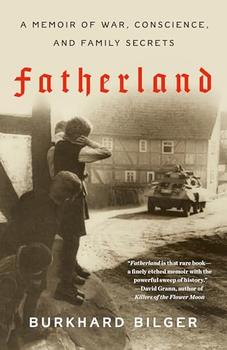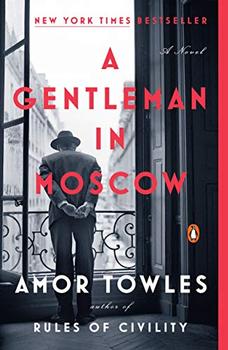Summary | Excerpt | Reading Guide | Reviews | Beyond the book | Read-Alikes | Genres & Themes | Author Bio

Three Generations of Love, War, and Survival
by Owen Matthews The quote featured on the jacket regarding Matthews' inspiration for
Stalin's Children is extremely appropriate and neatly summarizes the
book's intent. Matthews succeeds admirably in his goal of describing his
family's journey from Russia to England and back again, in the process
crafting a fascinating history that reads more like a novel than a work of
non-fiction.
The quote featured on the jacket regarding Matthews' inspiration for
Stalin's Children is extremely appropriate and neatly summarizes the
book's intent. Matthews succeeds admirably in his goal of describing his
family's journey from Russia to England and back again, in the process
crafting a fascinating history that reads more like a novel than a work of
non-fiction.
The book chronicles the lives of Matthews' Russian grandparents, aunt,
mother, and Welsh father (as well as delving briefly into his own) who were
all directly effected by one or more of the multiple political upheavals
that characterized much of Russia's 20th century history. Victims of
Stalin's Purge and later Communist crackdowns, most of the family somehow
managed to survive. Matthews, a one-time war correspondent for Newsweek,
relates his family's experiences with a reporter's eye for description and
detail, completely drawing his readers into his family's saga.
The narrative comes across as surprisingly objective, particularly when
Matthews discusses his male relatives. He says of his grandfather's
execution during the Great Purge:
Bibikov himself would have perfectly understood, with his rational mind, as he stood in a cellar or faced a prison wall in his last moments, the logic of his executioners. And perhaps – why not? – he might, if he had met different people in his early days in the Party, found different patrons, have become an executioner himself. Did he not explain away the famine which his Party had brought to the Ukraine as a necessary purging of enemy elements? Did he not consider himself one of the Revolution's chosen, ruled by a higher morality? Bibikov was no innocent, caught by an evil and alien force beyond his comprehension. On the contrary, he was a propagandist, a fanatic of the new morality – the morality which now demanded his life, however pointlessly, for the greater good.
Additionally, Matthews provides a dispassionate account of his
emotionally distant relationship with his father Mervyn, blaming neither his
father nor himself for the rift. Few authors are able to achieve this sense
of balanced reporting while still making a book interesting, particularly
when discussing so intimate a subject. Matthews, however, manages to do just
that.
 The information in Stalin's Children comes from numerous
conversations with Matthews' surviving Russian relatives, an enormous amount
of research, and the letters written between his mother and father during
their six-year separation. Much of the work, too, is based on Matthews' own
observations made during his visits to the country, as well as personal
knowledge gleaned during the years he lived in Moscow. He attempts to show
parallels between his life and that of his father's, bouncing back and forth
between the two eras. This is perhaps the only weak part of the book.
Readers may find themselves so wrapped up in the father's tale that the
switch to the son's is an interruption. Matthews relates more of his own
life later in the book, including a particularly harrowing account of
reporting from the war in Chechnya. Unfortunately, while it's apparent from
his press clippings that Matthews has lived a fairly adventurous life, most
of his experiences aren't recorded in Stalin's Children.
The information in Stalin's Children comes from numerous
conversations with Matthews' surviving Russian relatives, an enormous amount
of research, and the letters written between his mother and father during
their six-year separation. Much of the work, too, is based on Matthews' own
observations made during his visits to the country, as well as personal
knowledge gleaned during the years he lived in Moscow. He attempts to show
parallels between his life and that of his father's, bouncing back and forth
between the two eras. This is perhaps the only weak part of the book.
Readers may find themselves so wrapped up in the father's tale that the
switch to the son's is an interruption. Matthews relates more of his own
life later in the book, including a particularly harrowing account of
reporting from the war in Chechnya. Unfortunately, while it's apparent from
his press clippings that Matthews has lived a fairly adventurous life, most
of his experiences aren't recorded in Stalin's Children.
Overall, Stalin's Children is a well-written biography about
resilient people living in a tense, and dangerous, political climate.
Non-fiction readers will want to put this one high on their list.
Photos - Top: Joseph Stalin c.1942. Bottom: The author. Right: Nikolai Yezhov
![]() This review was originally published in The BookBrowse Review in October 2008, and has been updated for the
October 2009 edition.
Click here to go to this issue.
This review was originally published in The BookBrowse Review in October 2008, and has been updated for the
October 2009 edition.
Click here to go to this issue.

If you liked Stalin's Children, try these:

by Burkhard Bilger
Published 2024
A New Yorker staff writer investigates his grandfather, a Nazi Party Chief, in this "unflinching, gorgeously written, and deeply moving exploration of morality, family, and war" (Patrick Radden Keefe, author of Empire of Pain).

by Amor Towles
Published 2019
From the New York Times bestselling author of Rules of Civility - a transporting novel about a man who is ordered to spend the rest of his life inside a luxury hotel.
Your guide toexceptional books
BookBrowse seeks out and recommends the best in contemporary fiction and nonfiction—books that not only engage and entertain but also deepen our understanding of ourselves and the world around us.